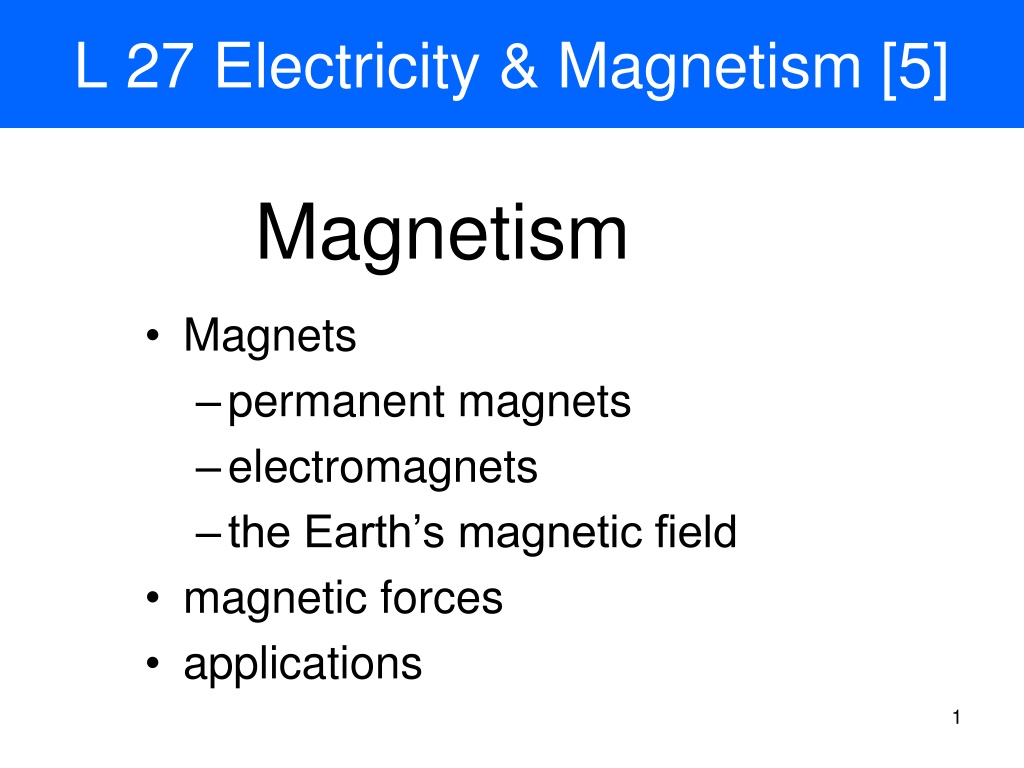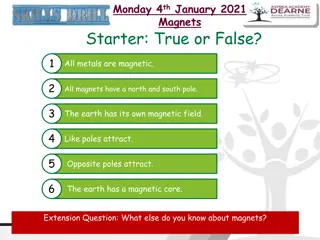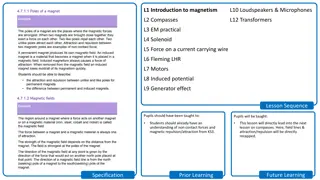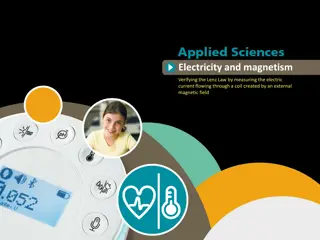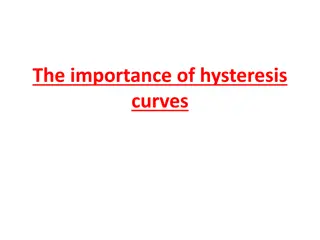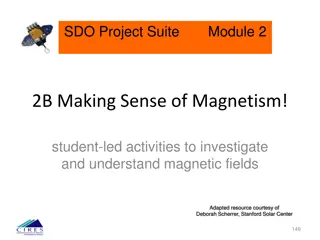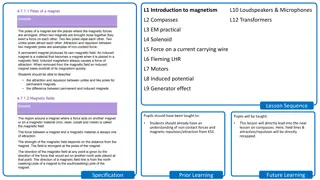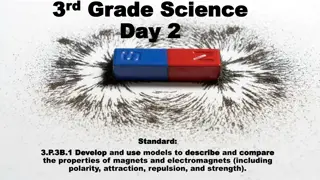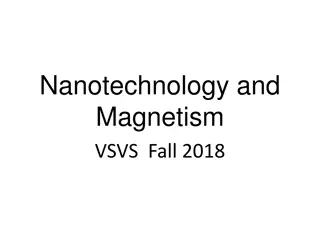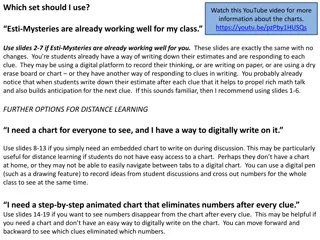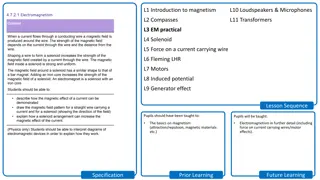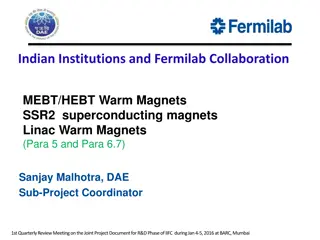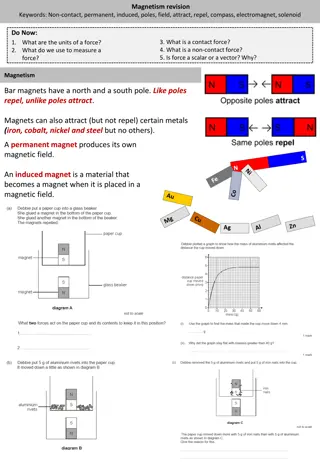Understanding Magnetism: From Permanent Magnets to Electromagnetism
Explore the fascinating world of magnetism, covering topics such as permanent magnets, electromagnets, Earth's magnetic field, and the applications of magnetic forces. Discover how magnets work, the properties of permanent magnetism, and the relationship between magnetic and gravitational fields. Delve into the creation and behavior of permanent magnets, including the role of rare earth elements. Learn about magnetic fields, compasses, and the observations of scientists like Oersted and Ampère in the development of electromagnetism.
Download Presentation

Please find below an Image/Link to download the presentation.
The content on the website is provided AS IS for your information and personal use only. It may not be sold, licensed, or shared on other websites without obtaining consent from the author. Download presentation by click this link. If you encounter any issues during the download, it is possible that the publisher has removed the file from their server.
E N D
Presentation Transcript
L 27 Electricity & Magnetism [5] Magnetism Magnets permanent magnets electromagnets the Earth s magnetic field magnetic forces applications 1
Magnetism two sources of magnetism permanent magnets electromagnets the earth s magnetic field how does a compass work the north pole is really a south pole! Van Allen radiation belts 2
Permanent magnetism certain minerals (magnetite, Fe3O4) are naturally magnetic These minerals will attract bits of iron a magnet produces a magnetic field in the space around it, just like the Sun has a gravitational field that holds the planets in their orbits the magnetic field can be visualized with iron filings 3
Earths magnetic and gravitational force fields Gravitational field Magnetic field 4
Permanent magnets Are made from alloys of some of the rare earth elements like neodymium, samarium, and cobalt. Always have a north and a south pole like poles repel and unlike poles attract if you break a magnet in half you get 2 magnets cannot have just a north or just a south pole N S S N S N 5
Magnetic field of a bar magnet 6 Oersted
ELECTROMAGNETISM I N S Hans Christian Oersted in 1820 observed that current flowing in a wire near a compass caused the compass needle to move. Andr -Marie Amp re in 1820, discovered the law relating the magnetic field and the current. 7
Magnetic field of a wire Long straight wire with current I The magnetic field lines form a set of concentric circles surrounding the wire The magnetic field is stronger close to the wire, and gets weaker away from the wire Magnetic field lines 8
Magnetic field of a solenoid A solenoid is a set of circular coils would on a cylindrical form. The field is similar to the field of a bar magnet. 9
Homemade magnets COIL Iron nail Duracell + You can think of the nail as a collection of little magnets that are randomly aligned. The magnetic field of the coil aligns these little magnets giving a larger field than that of the coil alone. We say that the nail becomes magnetized , but the effect is not permanent. 10
Inside a piece of iron UNMAGNETIZED atomic magnets PARTIALLY MAGNETIZED N S N S N S N S Spinning electrons NORTH SOUTH MAGNETIZED N S N S N S N S 11
Magnetic materials some materials are naturally magnetic or can be magnetized and retain their magnetism ferromagnetic materials other materials (iron) can be magnetized temporarily by placing them near magnets some materials have essentially no magnetic properties copper, aluminum, plastics... heat can destroy magnetism (Curie effect) 12
The earth is a big magnet The earth s north geographic pole is the south pole of a big magnet. A compass needle is attracted to the earth s north geographic pole The earth s magnetism is due to currents flowing in its molten core (not entirely understood!) The magnetic north pole is inclined about 14 from the geographic north pole, or by about 600 miles. 13
Sun Earth Connection: space weather earth SUN solar eruption Northern Lights (aurora) Space weather can have a large effect on communications, and it can cause damage to orbiting satellites and the power grid. 14
Solar eruptions CMEs (solar mass ejections) CMEs put out roughly 1012 kg of mass 15
Charges stay on magnetic field lines Electrons spiral around magnetic field lines they are trapped Electrons and protons that originate at the sun flow to earth as the solar wind The particles get trapped by the earth s magnetic field Very energetic particles can damage satellites 16
Van Allen Radiation Belts 2 regions around the earth where charged particles are trapped in the earth s Magnetic field 17
Magnetic forces Magnetic fields exert sidewise forces on charges A charge is turned around by the magnetic force There is NO magnetic force if the charge is not moving +q 18
Application: Magnetic deflection of electrons in a TV tube. 19
Magnetic forces on wires Magnetic fields exert forces on the electrons moving in a wire (current) S S N N Wire pulled IN Wire pushed OUT 20
Forces on current carrying wires The current in one wire makes a magnetic field that exerts a magnetic force on the current in the other wire Opposites repel Likes attract 21
Torque on a current loop in a magnetic field A loop of wire (coil) carrying current experiences a torque when placed in a magnetic field. The torque makes the loop rotate. 22
Application: The electric motor When a current is present in a coil, it experiences a torque and rotates. 23
Application: Magnetic force in a speaker The force between the permanent magnet and the voice coil moves the speaker cone 24
Application: MAGLEV Trains Magnetic levitation can be used to keep the cars on the track, and to propel them without touching 25
